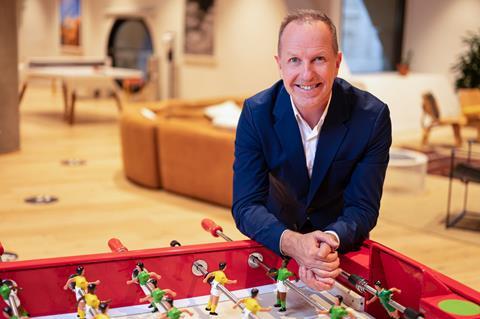Former England midfielder Trevor Steven now works as a mental health ambassador. He says construction must do more to look after its workers better

Construction sites, like football clubs, are a melting pot of diverse people, with different backgrounds, ages, religions and races. Both are traditionally fairly macho environments, both are still tied into working-class roots and both offer challenges to survive and fit in.
Historically, neither environment has been a place to talk about mental health. When I started as a professional footballer with Everton in the 1980s, talking about such things would be seen as a sign of weakness. However, that is where the road begins to part.
Football – and sport in general – has made great strides in destigmatising issues around mental health. We have started to see sporting stars and others in the public eye open up about such issues. The conversation has begun, the structures put in place and people are starting to feel more comfortable, bit by bit, in sharing their worries and concerns.

In construction, however, the statistics around suicide rates tell a different story. According to research by the CIOB in 2019 (pre-covid, note), one in four construction workers had contemplated suicide. The Lighthouse Club, a construction industry charity, confirms that every single working day in the UK two construction workers take their own lives, and stress, depression or anxiety accounts for 27% of all work-related illness in the industry.
So why is the provision of mental health support in the construction industry so poor? Answers include everything from the macho mentality, worries about job security and the isolation of being in a transient workforce, to late pay, tight deadlines and long hours. Poor welfare on site does not help – unions have warned for some years about the lack of hot water or adequate toilet facilities for many workers.
Something has to change, new approaches need to be adopted. It is time to think outside of the box.
How we run our company and our sites starts at the top, but the people who suffer the most if it is not done right are those farther down
I am mental health ambassador for Causeway Technologies and, along with Everton in the Community, we are starting a campaign to see how to join the dots between mental health, football and construction. I think part of looking for new approaches is viewing other sectors and seeing what has worked (or not worked), and so the construction industry can learn lessons from sport and utilise the very obvious connections and emotional relationships that exist between construction and football.
One of the most important steps is the creation of a culture within the workforce to ensure that we are looking out for each other. In a sector where there are many transient workers, this needs to be embedded structurally, with familiarity and signposting for help, not just a poster on the wall.
A lot of this must come from management. How we run our company and our sites starts at the top but the people who suffer the most if it is not done right are those farther down. In football, you often hear the term when a manager has “lost the dressing room” – that occurs when the culture is not managed, and communication channels fail.
This is the responsibility of management, making sure that your workers are looked after, are listened to and communicated with through regular meetings; making sure that the working facilities are up to scratch, including the basics such as toilet and breakout rooms; and that there is no bullying or isolation of workers.
These things do not just support mental wellbeing, they also create teams that perform to the best of their ability, both in football and the workplace.
Why do we think football can reach people in ways that other initiatives cannot?
The badge. There is a unique relationship between an individual supporter and their team. Football takes a person away from the workplace, from their troubles. It has been compared to a religion.
Whether that is true or not is a different matter, but it is undoubtedly a strong personal and emotional relationship, more than just a brand and one that is often cultivated over generations. The football badge brings trust.
And trust is key to opening up conversations about mental health and showing vulnerability, which is why Causeway has partnered with Everton in the Community to start this campaign. They have a fantastic track record in tackling mental health issues, including The People’s Place - a purpose-built mental health hub providing an extensive range of support platforms and activities to improve mental health and promote suicide prevention.
Football clubs also have great local reach. There are 29,000 Everton fans on the club’s database who work in the construction industry – if you consider that one in four of them could contemplate suicide that equates to 7,500 people Everton supporters alone that we could reach out to.
Everton in the Community is reaching people previously outside of the conversation, changing lives for the better, and we want to replicate that across the country.
The construction industry definitely does have the capacity to change, despite the tragic statistics. Just look at how much progress has been made in other areas of health and safety
This new mental health campaign initially focuses on research to better understand the causes of mental health problems in the wake of the covid restrictions, and the support required for site-based workers using new tools such as technology, apps and online support.
We hope to use this research to lobby the government for a change in legislation to support better mental health in the construction sector.
The construction industry does have the capacity to change, despite the tragic statistics. Just look at how much progress has been made in other areas of health and safety. But this campaign for change isn’t going to happen overnight with a single organisation. To make real change in our industry demands a collaborative effort – we need to rally together as a whole in the name of change.
Trevor Steven played football for Burnley, Everton, Rangers and Marseille between 1980 and 1997. He also won 36 caps and scored four goals for England
It is International Stress Awareness Week from 7 November, and Stress Awareness Day on 9 November
Every Person Counts

Building’s Every Person Counts Campaign aims to provide a place where debates about skills, employment and workplace culture can play out and solutions can be shared.
We know the construction industry has no shortage of suggestions for tackling the skills crisis. From reforming apprenticeships, to offering more flexibility, to increasing diversity, to supporting wellbeing and mental health, to providing better pathways from education to the workplace. We will be picking up on all these themes in more depth in future articles.
If you have an employment initiative you want to tell us about, email us at newsdesk@building.co.uk with the subject line “Every Person Counts”. You can also contact us via Twitter @BuildingNews and LinkedIn @BuildingMagazine, please use the hashtag #everypersoncounts. We look forward to hearing your employment stories.


























No comments yet